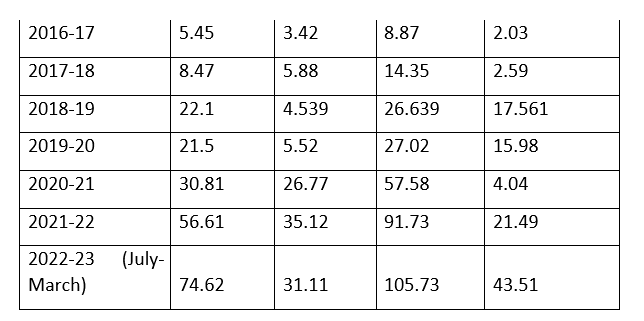INP-WealthPk
Arsalan Ali
The Preferential Trade Agreement (PTA) between Pakistan and Uzbekistan has significant potential to take bilateral trade to new highs, said a senior official. “Both countries have agreed to reduce customs duties on 17 different tariff lines, aiming to boost bilateral trade and potentially reach a trade volume of $1 billion,” said Muhammad Usman Baig, International Trade Officer at Trade Development Authority of Pakistan (TDAP). He elaborated that customs duty on certain items such as cement, maize starch, plates, sheets, film, foil, and strip of non-cellular polyethylene terephthalate, carboys, bottles, flasks, jars, pots, phials and containers, as well as tubes, pipes, and hollow profiles, has been decreased by 100%. He said reduction in customs duty on cement opens up opportunities for Pakistan to increase its exports to Uzbekistan. Currently, he said, Pakistan's major cement importers are Afghanistan, Sri Lanka, Bangladesh, and Madagascar. Usman mentioned that in March 2023, Pakistan produced 3,570 tons of cement.
Despite domestic cement industry's capacity of 65 million tons and local consumption of only 40 million tons, exports are limited to 4 to 5 million tons. He further stated that during the seven-month (July-January) period of FY23, cement industry earned $100.63 million through the export of 2.061 million tons of cement and clinker. The retail price range for maize starch in Uzbekistan falls between $5.5 and $8.25 per kg, presenting a favourable opportunity for exporters. Kenya, United Arab Emirates, and Bangladesh are key importers of maize starch. Pakistan has successfully exported maize starch with a value of $14.44 million, while its domestic maize production has reached 7.8 million tonnes. Tubes, pipes, and hollow profiles are primarily imported from Australia, Canada, Sri Lanka, and Germany. Pakistan consistently earns $52.118 million annually through the export of these products. Carboys, bottles, flasks, jars, pots, phials, and containers find major importers in the Philippines, Indonesia, Turkey, and Afghanistan.
Pakistan's total export value for these products amounts to $10.806 million per year. Canada, United States, Germany, and UAE serve as the principal importers of plates, sheets, film, foil, and strip of noncellular polyethylene terephthalate. Pakistan generates $51.883 million annually from the export of these products. Usman said a 20% reduction in customs duty has been applied to items like fresh or dried bananas, fresh or dried wilking and similar citrus hybrid), (sweet biscuits), (tobacco in raw form), (paints and varnishes), (plates, sheets, films, foil, and strip), (float glass, surface polished glass, hand tools including glaziers' diamonds of base metal, and telephones for cellular networks or wireless networks. Pakistan's banana production spans approximately 35,000 hectares, yielding a total of 154,800 tons, with an average yield of 4 tons per hectare. However, this average yield is only one-fifth of the global average. Pakistan's banana exports amount to $12.813 million.
The country annually exports around 0.44 million tons of citrus, valued at approximately $166 million. In 2021, Pakistan's citrus fruit production reached 2.33 million tonnes. Pakistan's major exports in the category of plates, sheets, film, and foils are primarily to Sri Lanka, UAE, Bahrain, and Afghanistan, with a total export value of $14.466 million per year. The paint and varnishes industry in Pakistan is valued at Rs37 billion. Major exports of paint and varnishes are directed to Afghanistan, Qatar, Sri Lanka, and Kazakhstan, totalling $5.59 million every year. Furthermore, the per unit price of citrus in Uzbekistan is $1.2/kg, indicating significant potential for Pakistan to expand its citrus exports. Sweet biscuits from Pakistan find major importers in Afghanistan, UAE, and Somalia, with exports reaching $23.05 million. Pakistan's major exports of tobacco, either partially or wholly stemmed, are directed towards Belgium, Indonesia, Kenya, and the Philippines.
In 2021-22, Pakistan exported 22 million kg raw tobacco, earning $18.66 million. The Philippines, Sri Lanka, Indonesia, and Kenya serve as major importers of float glass and surface-polished glass from Pakistan. The total export value of float glass from Pakistan amounts to $34.211 million. Pakistan exports hand tools, including glaziers' diamonds made of base metal, to the US, Germany, the UK, and France. The total export value of these products from Pakistan is $6.744 million. Major importers of telephones for cellular and wireless networks include UAE, China, Liberia, Bahrain, Bangladesh, Vietnam, the UK, and Zambia.
Usman said customs duty on bakery items and chemical products has been reduced by 30%. Pakistan's significant exports of bakery items are primarily directed towards the US, UK, Saudi Arabia, and Canada. The country consistently exports bread, pastry, and cake, generating approximately $22.222 million in revenue annually. Major importers of chemical products from Pakistan include Kenya, Nigeria, China, and Bangladesh. Pakistan's export value of chemical products amounts to $11.214 million.


Usman said that over time, Pakistan's exports to Uzbekistan have exhibited a positive growth trend, with a notable value of $74.62 million in goods exported during the first nine months of FY23. The trade balance was in favour of Pakistan.
Credit : Independent News Pakistan-WealthPk



